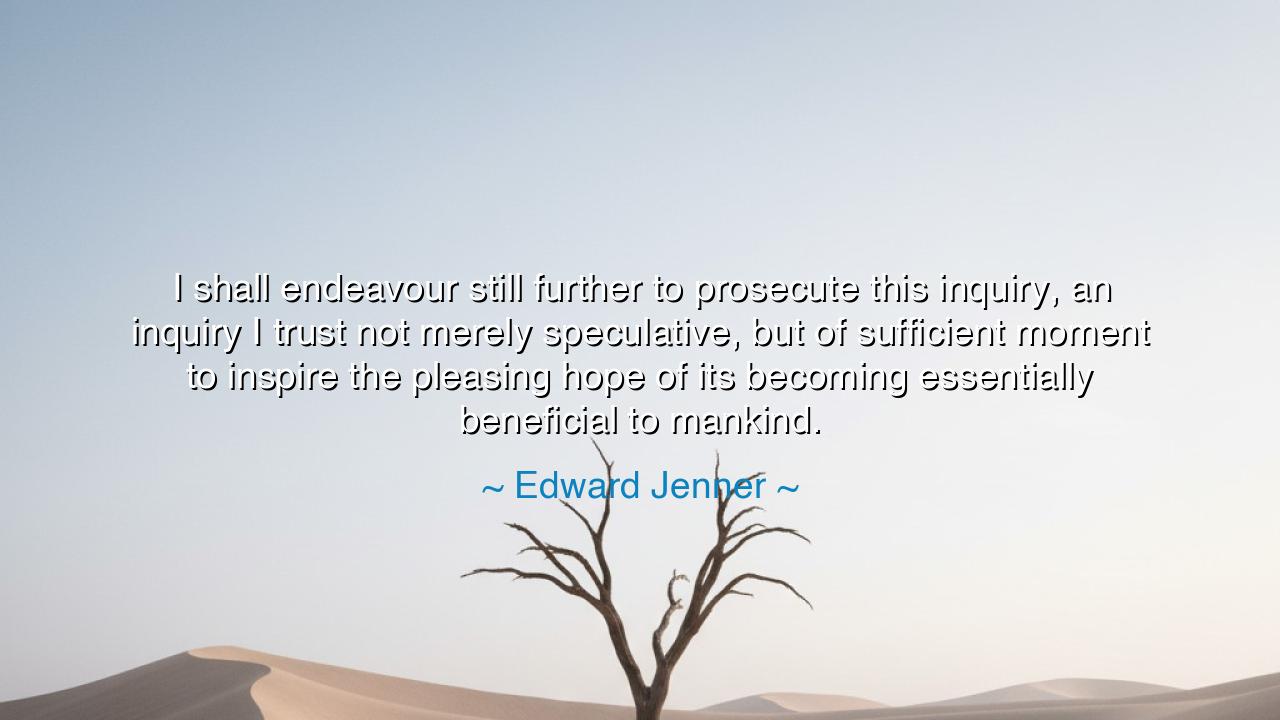
I shall endeavour still further to prosecute this inquiry, an
I shall endeavour still further to prosecute this inquiry, an inquiry I trust not merely speculative, but of sufficient moment to inspire the pleasing hope of its becoming essentially beneficial to mankind.






“I shall endeavour still further to prosecute this inquiry, an inquiry I trust not merely speculative, but of sufficient moment to inspire the pleasing hope of its becoming essentially beneficial to mankind.” Thus spoke Edward Jenner, the humble English physician whose curiosity and courage gave birth to one of humanity’s greatest triumphs—the vaccine. In these words, drawn from his reflections during the early days of his groundbreaking research, Jenner reveals not only the mind of a scientist, but the soul of a seeker of truth and benefactor of humanity. His statement is not the language of pride, but of purpose—a vow to pursue knowledge not for glory, but for the good of all.
In an age when disease was both mystery and terror, when smallpox scarred the faces of nations and carried away millions, Jenner dared to inquire into what others dismissed as superstition. He had heard from milkmaids that those who caught the mild illness of cowpox never fell to smallpox. What to others was rural gossip, he made into a question of scientific faith. He saw in this rumor the whisper of a great truth—and in that whisper, the “pleasing hope” that his work might become “beneficial to mankind.” Here, in this sentence, the spirit of the Enlightenment meets the compassion of the healer. Jenner’s words capture the essence of progress: that knowledge, when pursued with humility and hope, becomes the servant of life.
This declaration also reveals the moral courage of discovery. For Jenner’s “inquiry” was not a safe or easy one. He faced skepticism, ridicule, and the ever-present shadow of failure. To question accepted wisdom in his time was to invite scorn, and to test a new method upon living flesh was to risk accusation of madness or cruelty. Yet he pressed on, not “merely speculative,” as he said—not for theory alone—but with the firm conviction that truth must be proved by deed, and that the fruits of knowledge are measured not in papers and lectures, but in the saving of lives.
Consider the moment in 1796 when Jenner performed his first vaccination on young James Phipps, an eight-year-old boy. With trembling hand but resolute heart, he introduced the cowpox matter into the boy’s arm, and later exposed him to the deadly smallpox. The child lived, unharmed. In that instant, Jenner’s “pleasing hope” became living proof—a seed of salvation for millions unborn. The timid inquiry of one man had become the deliverance of humankind. Yet even then, Jenner did not speak of triumph. He spoke, instead, of continuing the inquiry, of pushing further, ever guided by the same faith—that truth, rightly sought, is never speculative but sacred.
The ancients would have revered such a man as one favored by the gods. For they too believed that inquiry, when united with virtue, was the noblest of human labors. The Greek philosophers taught that knowledge without goodness leads only to ruin; the Roman sages held that wisdom is the gift of those who seek not wealth but the welfare of their people. Jenner’s words stand in that same lineage of moral science. He did not view his research as conquest over nature, but as service to life—a covenant between mind and mercy. His was not the arrogance of intellect, but the humility of one who knows that truth is found not by domination, but by listening to the quiet laws of the universe.
The meaning of his quote, then, reaches far beyond medicine. It is a call to all who seek to learn, to build, or to lead. It says: let your inquiry be not idle, but purposeful; not vain, but benevolent. Knowledge pursued only for pride becomes sterile, but knowledge pursued for the good of others becomes eternal. Every teacher, inventor, artist, and thinker must ask: does my work heal, enlighten, uplift? Does it carry within it, as Jenner’s did, the hope of being “essentially beneficial to mankind”? For it is not enough to know—we must know for love.
The lesson, my listener, is this: to seek truth is holy, but to use truth for good is divine. Be like Jenner—curious, patient, and steadfast in purpose. When the world doubts you, let faith in your cause be your armor; when success tempts you to pride, let humility remind you that your gifts are not yours alone, but given for the service of all. The measure of greatness is not in what one discovers, but in whom one helps by that discovery.
So remember the words of Edward Jenner: “I shall endeavour still further to prosecute this inquiry… not merely speculative, but… beneficial to mankind.” Let this be the vow of every heart that seeks meaning: to labor not for vanity, but for virtue; not for applause, but for awakening. For in the quiet perseverance of one man’s inquiry, the world found deliverance from death—and in the spirit of that same inquiry, we find the model of all true greatness: to learn, to serve, and to love, for the good of humankind.






AAdministratorAdministrator
Welcome, honored guests. Please leave a comment, we will respond soon